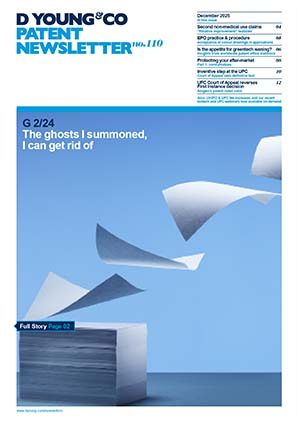Withdrawn marketing authorisations and SPCs: CJEU provides clarification
In a recent decision, the Court of Justice of the European Union (CJEU) determined that Article 3(d) of the SPC (supplementary protection certificate) Regulation is to be interpreted as meaning that the first marketing authorisation (MA) for a medicinal product refers to the MA which was granted on the earliest date for that product in the member state concerned, regardless of whether or not that MA is still in force at the time of filing an SPC application.
Background
This case relates to the interpretation of Articles 3(b) and (d) of Regulation (EC) no 469/2009 (the SPC Regulation) which state: “[An SPC] shall be granted if, in the Member State in which the application referred to in Article 7 is submitted and at the date of that application: (b) a valid [MA] as a medicinal product has been granted in accordance with Directive [2001/83] or Directive [2001/82], as appropriate; (d) the authorisation referred to in point (b) is the first [MA] as a medicinal product.”
The reference to the CJEU originated from an appeal by Genmab A/S against a decision of the Hungarian Intellectual Property Office refusing to grant it an SPC for a medicinal product marketed under the name Kesimpta®.
Genmab was the holder of European patent EP3284753 (the basic patent), which was in force in Hungary and covered, inter alia, the active ingredient ofatumumab. Genmab sought approval to market its first medicinal product, Arzerra, containing ofatumumab, for use in a therapy for untreated chronic lymphocytic leukaemia. On 21 April 2010, Genmab was granted a marketing authorisation for that medicinal product (the prior MA). However, it withdrew the prior on 27 February 2019.
On 29 March 2021 Genmab was granted an MA for the medicinal product Kesimpta®, of which ofatumumab is also the active ingredient (the subsequent MA), for the treatment of relapsing-remitting multiple sclerosis.
On 07 July 2021, on the basis of the basic patent and the subsequent marketing authorisation, Genmab applied for an SPC. The Hungarian IP Office rejected the application on the basis that the subsequent MA was not the first MA for ofatumumab. The Hungarian IP Office noted that Arzerra and Kesimpta shared identical active ingredients, with the only difference lying in their respective therapeutic indications. The Hungarian IP Office referred to the CJEU’s decisions in Abraxis (C-443/17) and Santen (C-673/18) and took the view that, as the active ingredients are identical, the prior MA must be regarded as the first MA. Based on this, the Hungarian IP Office concluded that it was irrelevant that the prior MA had been withdrawn and was no longer in force on the date when the application for an SPC was lodged.
Genmab brought an appeal before the Budapest High Court (the referring court) against the decision of the Hungarian IP Office. Genmab submitted that, based on the language of Articles 3(b) and (d), the first MA can only be an MA in force on the date of lodging the application for an SPC, which in this case was the subsequent MA. Genmab argued that the Abraxis and Santen CJEU decisions were irrelevant, since neither addresses the question of the validity of the prior MA and in these cases the MAs in question were in force.
The referring court pointed out that the CJEU had not yet addressed the question of which marketing authorisation must be regarded as the first MA for the product in question, as a medicinal product where that product was already covered by a prior MA, but that MA had been withdrawn. As a result, the court referred the following question to the CJEU for a preliminary ruling: “Must Article 3(b) and (d) of [the medicinal products SPC Regulation] be interpreted as meaning that [an MA] predating the [MA] appearing in the application for [an SPC] and referring to the same product must be regarded as the first [MA] for the purposes of that regulation, even where that prior [MA] was withdrawn prior to the submission of the application for the [SPC]?”
Decision
In its decision, the CJEU concluded that the condition laid down in Article 3(d) should be interpreted as meaning that the first MA for a product is the marketing authorisation which was granted on the earliest date for that product in the member state concerned, regardless of whether or not that marketing authorisation is still in force. The CJEU based its decision on the following points.
First, the CJEU decided the wording of Article 3 of the SPC Regulation states that an SPC is to be granted if, in the member state in which the application is submitted, the marketing authorisation granted for the product is the first MA for the product as a medicinal product. The CJEU considered it is not apparent from that wording that that first MA must be the first MA only among those in force on the date of lodging the application for an SPC, but rather account must be taken of all the MAs which have been granted.
Second, the CJEU considered it apparent from Article 3 that it sets out four independent and cumulative conditions which cannot be merged. In that respect, Article 3(b) of requires that the product has been granted a “valid” marketing authorisation. Article 3(d) refers to Article 3(b) only in order to identify the marketing authorisation which must satisfy the additional and independent condition which it sets out therein. Accordingly, under Article 3(d), account must be taken of all the MAs granted for that product before the date of lodging the application for an SPC. A contrary interpretation of Article 3(d), to the effect that only MAs in force on that date should be taken into account, would amount to confusing the two conditions by merging the concept of a “MA” with the concept of a “valid MA”. The CJEU also noted that this interpretation must be rejected in the light of Article 8 of the SPC Regulation, which outlines the content of the SPC application. Article 8 indicates that the application is to contain the number and date of the marketing authorisation referred to in Article 3(b) of the SPC Regulation and, if it is not the first MA for the product in question, the number and date of that first MA. The CJEU suggested that, if only the marketing authorisations in force were to be taken into account, Article 8 of the SPC Regulation would require that such information be provided.
Moreover, the CJEU noted that the legislative history of Article 3 explains that it is common for the same product to be successfully granted several marketing authorisations, in particular each time a modification is made affecting the pharmaceutical form, dose, composition or indications. Nevertheless, the CJEU ruled that it is the first MA for the product in the member state in which the application is presented that is taken into account for the purposes of compliance with the SPC Regulation, in particular for calculating the period of six months in which the holder of the basic patent has to submit an SPC application. Thus, the CJEU considered that, although the same product may be the subject of several patents and several marketing authorisations in one and the same member state, the EU legislature decided that an SPC will only be granted for that product on the basis of a single patent and a single marketing authorisation, namely the first chronologically granted for that member state.
The purpose of the SPC Regulation is to encourage pharmaceutical research. However, in this regard, the CJEU held that that the legislature intended to protect not all pharmaceutical research giving rise to the grant of a patent and the marketing of a medicinal product, but to protect only research leading to the first marketing authorisation of an active ingredient as a medicinal product. That objective would be undermined if only the MAs in force were taken into account in order to determine the first MA for a given product.
Implications
The CJEU has favoured a strict interpretation of Article 3(d) in line with recent decisions relating to this provision, in particular Abraxis and Santen. As a result, supplementary protection certificate applicants should ensure that their applications are based on the first MA for the medicinal product in question, regardless of whether previous MA’s have been withdrawn for that product. It is clear that the CJEU wishes to avoid a situation where an applicant could withdraw a prior MA in order to be granted an SPC for the latest marketed version of the product in question.
Useful link
Regulation (EC) No 469/2009 of the European Parliament and of the Council of 06 May 2009 concerning the supplementary protection certificate for medicinal products (PDF): dycip.com/regulation-469-2009

